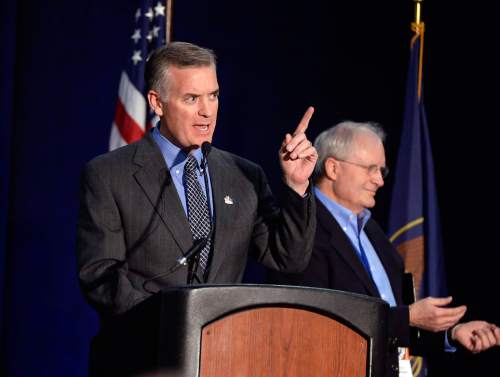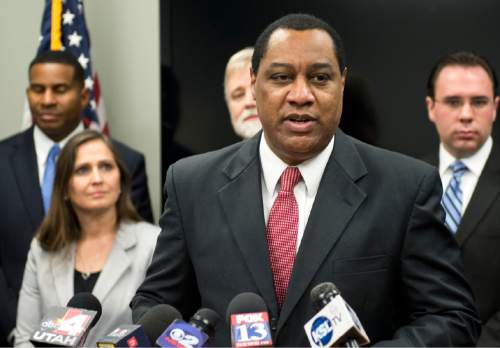This is an archived article that was published on sltrib.com in 2016, and information in the article may be outdated. It is provided only for personal research purposes and may not be reprinted.
With less than three weeks until the Utah Republican Party's nominating convention, the chaos continues over how the party will choose its candidates, although the state Supreme Court may start to clear up the picture after appearing to show skepticism over a pair of challenges to the election law Monday.
Justices seemed to be leaning toward an interpretation of the state election law that would allow candidates to choose whether to gather signatures to get on the primary ballot, go to the party's convention for the ballot spot, or both.
The Republican Party has contended the law lets the party choose and the party has chosen to only allow candidates who go to the party's nominating convention to vie for the party's nomination.
Marcus Mumford, the attorney for the Republican Party, said the state can run elections but can't tell the party to change it's rules — comparing it to the state giving the Utah Jazz an arena to play in, but can't tell the coach who to play in the game.
But Justice Christine Durham said the language of the law is clear: the member gets to choose and the party has to comply with the statute if it wants to be a qualified political party. Justice Deno Himonas agreed, saying the statute is clear in giving candidates the choice.
The justices were even more skeptical of an argument by the Utah Democratic Party, which is seeking to have the Republican Party and its candidates disqualified if the GOP tries to kick candidates off the ballot for gathering signatures and skipping the party convention.
Justices argued that, until the party tries to intervene and kick candidates off the ballot, the issue is not ripe for the court to issue a ruling.
"They met the requirements and the lieutenant governor certified them as a qualified political party," Durham said. "Everything else is after-the-fact, whether they've disqualified themselves by these threats. But if these threats are never acted on … don't they still have the [qualified political party] status?"
Assistant Attorney General David Wolf argued that disqualifying the Republican Party and its candidates would be an "absurd result" that would end up disenfranchising the candidates and the delegates who vote for those candidates at the party convention.
If the party loses its status, Wolf said, it is the position of the state elections office that the party's 119 candidates who are going to convention and not gathering signatures would still be given a place on the primary ballot, because the candidates complied with the rules in place when they filed to run.
The Democrats have challenged the eligibility of those 119 candidates to be on the ballot, based on the party's argument that the GOP should be disqualified and its candidates should have to gather signatures.
The lieutenant governor's office has already rejected that challenge and the party has sued to have the ruling reversed. That separate case is pending in 3rd District Court and is on hold awaiting a decision by the Utah Supreme Court.
"I guess they can't win elections, so I guess they go to court and try to win this way," Utah Republican Party Chairman James Evans said of Democrats.
Attorneys in the case say they expect a relatively quick ruling form the state's high court, with a decision coming as soon as the end of the week.
The issue stems from the Legislature's passage of SB54 in 2014, which was intended to create a dual track for candidates to get to the ballot — gathering signatures, going to the party's convention, or both.
The bill was in response to an effort by Count My Vote, a group of well-connected Utah politicos, who sought to replace the convention with a system of signature gathering and direct primaries. Count My Vote leaders argued the convention catered to the most radical elements in both parties and produced candidates who did not represent mainstream Utahns.
Lawmakers struck the dual-track system as a compromise to preserve the convention, but the state Republican Party has been engaged in months of litigation fighting to overturn the signature path.
Assuming the Supreme Court refuses to intervene on the Democrats' request and also rules that candidates are allowed to choose signature gathering, the convention, or both, the case moves back to federal court.
There, U.S. District Judge David Nuffer has scheduled a hearing for April 15, where he will hear arguments on the extent to which the party gets to control who is a member of the party.
The GOP contends that party membership hinges on complying with the party's rules, which require a candidate for office to seek the nomination through the party convention — not through signature-gathering. Candidates are required to sign a pledge that they will abide by those rules.
With the Republican Party state convention scheduled for April 23, here is how the process will play out:
• GOP candidates who get support from 60 percent of the delegates will go directly to the general election ballot, unless they have an opponent who has gathered enough signatures to qualify for the primary ballot. If that is the case, then both candidates will go to a June primary.
• If two candidates fall short of 60 percent of the vote at convention, both will go on the June primary ballot, along with any other candidate who has met the signature threshold.
• Sixty-five Republican candidates have met the signature requirements and will have a spot on the primary ballot, as will others who meet the requirement before the primary.
Evans, the GOP chairman, said that, if Nuffer rules in the party's favor, the party will seek to disqualify candidates who are gathering signatures and not going to the party convention. There are 29 candidates who are only gathering signatures.
"It would inform the lieutenant governor that you cannot put a Republican on the ballot that did not go through convention," Evans said.
Wolf said, because the window to challenge a candidate's eligibility closed last month, it's not clear how the lieutenant governor's office would be able to respond if the party tries to disqualify candidates.
Both sides are also awaiting a ruling from Nuffer on whether the signature thresholds in the election law are so high that they make it practically impossible for some candidates to get on the primary ballot and are unconstitutional.
Nuffer had initially hinted he might be inclined to strike down the signature thresholds, but after a recent hearing seemed more inclined to let those stand, because candidates also had a constitutional option to go to the party convention.
Twitter: @RobertGehrke





